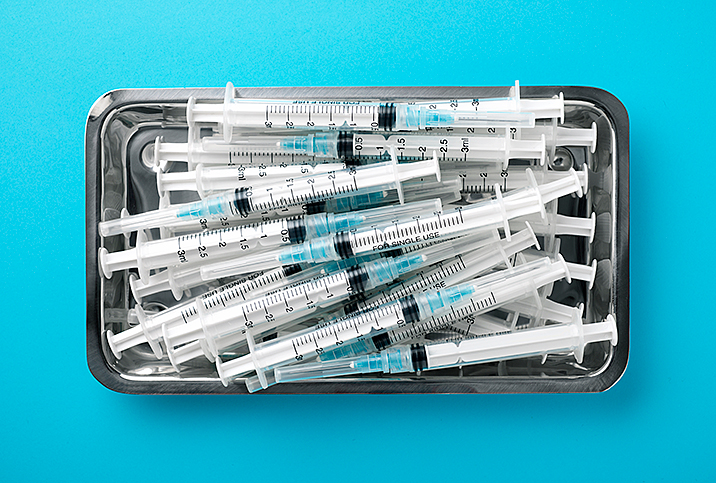Quit Blaming Low-T for All of Your Problems

Men sometimes have a difficult time with the nuances of a metric. It's OK. We know it.
The parameters are always easiest when diametric and simple, without much room for subtlety: win or lose, do or die, go big or go home. When considering medical issues, however, the critical gray areas are sometimes lost behind the blinders of masculine perception.
Testosterone provides one such example. The hormonal hype surrounding testosterone, which does play a key role in reproductive and other health functions, is a little bit overblown.
A matter of measurement
"In our sedentary lifestyle, I think that sometimes poor energy and lack of motivation are blamed on testosterone because it's a number that we can get that somebody has given an arbitrary range to," said Matthew J. Mutter, M.D., a urologist and men's health clinician with LSU Healthcare Network in New Orleans.
To the average patient, their testosterone level can seem like a scorecard of sexual, reproductive and general health. But that scorecard might be misleading if you take it at face value. The score often doesn't represent the quality of the game.
"It happens all the time: You put a man on testosterone—whether he is young, old or middle-aged—and he comes back four weeks later," Mutter said. "Sometimes, I don't tell the guy his testosterone level until after I ask him how he is feeling. Sometimes, they'll say, 'I don't really notice a difference,' and I'm like, 'Well, man, you were at 250 and now you're at 650.' And they [can't believe it]."
Testosterone levels can guide doctors and patients toward the best set of decisions and medical practices to help the patient achieve the desired results. But they should be viewed as little more than a singular tool in the arsenal of assets available to the medical community. The right lab is always useful to the right doctor, but a single score can't summarize your sexual or other health circumstances.
"It's just a lab value that can be assigned low, normal or high," Mutter said. "Do you really know what that means? No."
Is testosterone or something else causing symptoms?
Some of the symptoms of testosterone deficiency are vague, said Wael Almajed, M.D., a urologist and sexual medicine specialist on fellowship with Tulane University in New Orleans. Symptoms include fatigue, weight gain, loss of muscle mass and sometimes erectile dysfunction (ED), but these same symptoms can also present because of lifestyle.
Over and over again, this theme comes up in many aspects of comprehensive health management. Medications and exogenous treatments can work wonders with health challenges, but so can a bit of applied knowledge and effort when you need to meet the demands of your body regarding nutrition, sleep, exercise and other fundamental health components.
"Patients who are overweight and have an unbalanced diet, and also have a stressful lifestyle, can also produce similar symptoms, like fatigue and weight gain and so on," Almajed said. "So sometimes, just improving the lifestyle and eating healthier and avoiding stress can significantly improve those symptoms, and even can raise the testosterone level better than looking at the testosterone itself as the causative factor."
The right lab is always useful to the right doctor, but a single score can't summarize your sexual or other health circumstances.
There is no doubt that for many men, testosterone treatments of various kinds have been helpful. But testosterone can be the red herring of common health issues for men. Fixation on your testosterone level and supplemental treatments to compensate can have dangerous results, Almajed said.
"Testosterone injections and therapy in general, although routinely done and generally safe, does have some [potential] side effects, such as an increase in hematocrits, or the red blood cells, and the hemoglobin production is increased to the point that it becomes dangerous and can be a precursor for stroke or thrombus [blood clot] formation," he said.
"We constantly monitor these patients with blood counts almost every three to six months to make sure this doesn't happen," Almajed continued. "And if it happens, then we ask them to do a phlebotomy [blood removal]."
By working effectively with your medical team, you can avoid these detrimental experiences. Surveillance and data are critical to most treatments, and testosterone treatments require relatively frequent observation.
Win, lose or draw
It's pretty simple, really: Your testosterone level can be low, high or somewhere in between. Regardless of where you stand, there are options for improvement and there's the possibility of setbacks. Ultimately, you choose how to manage your own lifestyle and how well you listen to the advice and guidance of your medical professionals.
If you're unsatisfied with some aspect of your health, you can probably do something about it. With the right coaching and approach, refining your activities and lifestyle might be all it takes to achieve your personal health goals. If not, a course of testosterone treatment or supplements might be right for you.


















